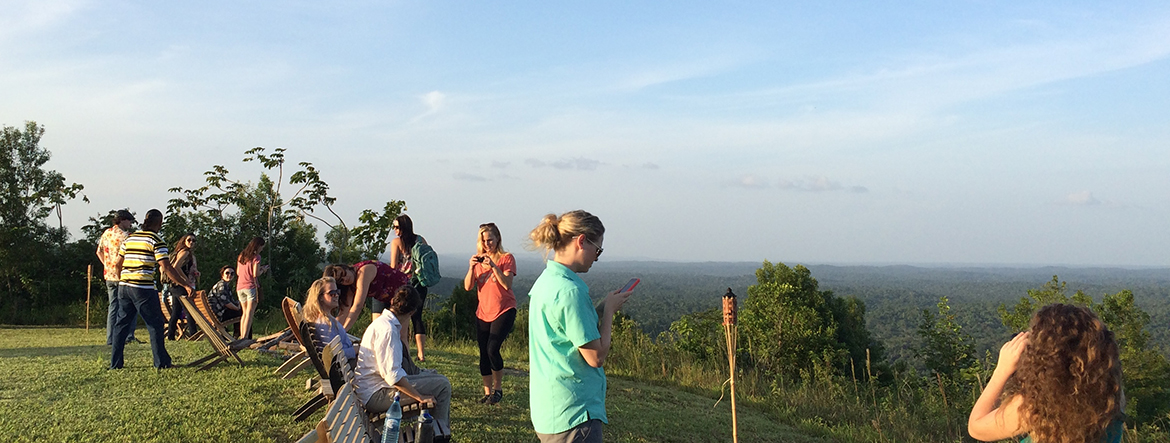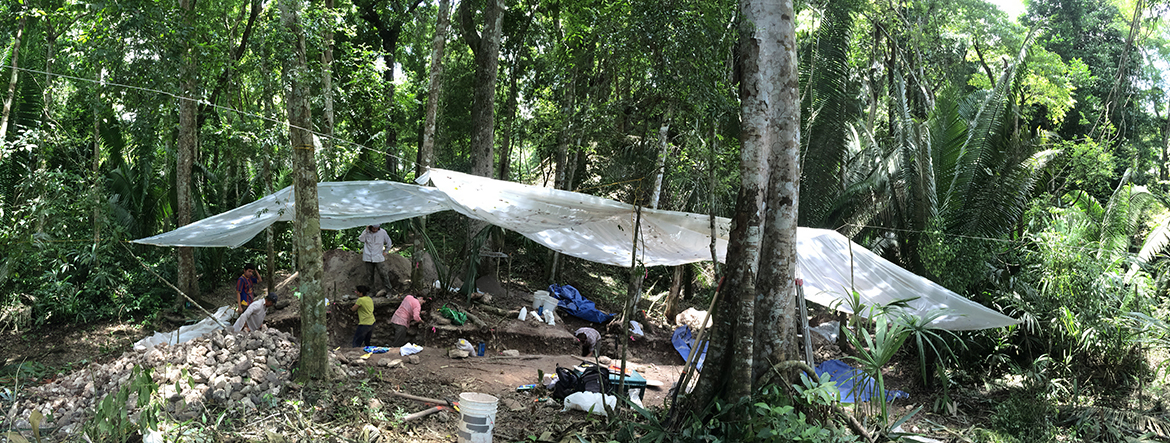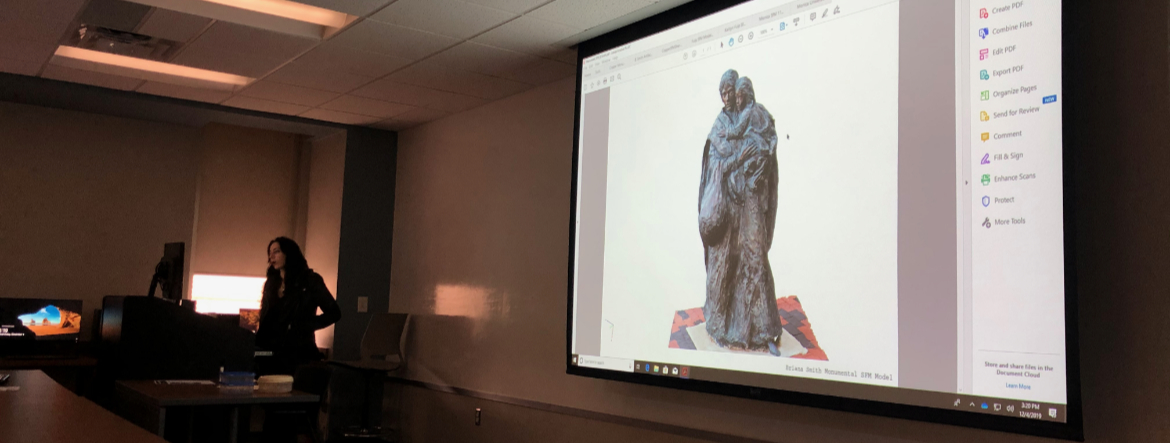Anthropology Graduate Program
The graduate degree program in anthropology is designed to provide broad training for students who wish to enter a Ph.D. program, prepare for undergraduate or community college teaching, or pursue a non-teaching career for which M.A.-level training in anthropology is appropriate and useful. The program emphasizes training in basic theory and methods. We follow a three-field approach to anthropology at the graduate level, meaning all students take a "core" class in each subfield (ethnology, biological anthropology, and archaeology), but can then specialize in their area of interest by taking elective courses and conducting thesis research.
If you are interested in applying or learning more about the program, you should contact the professor who best matches your research interest to learn about his/her research and to inquire if he/she is accepting new students. You may also download the latest version of our graduate student handbook.
The anthropology faculty who supervise graduate students are:
Archaeology
Dr. Brett A. Houk: Texas prehistory, Mesoamerica, Maya archaeology, ancient urban planning, Cultural
Resource Management (CRM).
Dr. Tamra Walter: Historic archaeology, Spanish Colonial Texas, coastal Ecuador.
Ethnology
Dr. Lauren Miller: Tourism, pilgrimage, performance, martial arts, capoeira, sustainability, African diaspora, Latin America, Brazil, Belize, and the anthropology of higher education.
Dr. Michael Jordan: Ethnohistory and Expressive Culture of the Plains Indians, Economic Aspects of the Southern Plains Powwow, Historical Consciousness in Indigenous Communities, Digital Heritage Initiatives.
Dr. Jeffrey Williams: descriptive and documentary linguistics, contact linguistics, dialectology, endangered languages, Papuan languages, varieties of English in the West Indies, languages of mainland Southeast Asia.
Biological Anthropology
Dr. Arthur Durband: Paleoanthropology of Indonesia, Europe, and Australia, the origins of modern humans, the biology of early Australians, and virtual anthropology.
Dr. Mari Isa: Human osteology, forensic anthropology, skeletal trauma analysis, bone biomechanics, personal identification.
Dr. Anna Novotny: Human osteology, bioarchaeology, biogeochemistry, biodistance, mortuary analysis, ritual and worldview, Mesoamerica, ancient Maya, Ohio Hopewell.
Coursework
Decisions on the program of study, specific courses, and thesis topics are made through consultation with the graduate advisor and other faculty members as appropriate on the basis of the student's background, interests, and objectives.
The anthropology curriculum requires 9 hours of core courses in the following three subfields: archaeology, biological anthropology, and ethnology. Students are required to take ANTH 5305 (ethnology core), ANTH 5341 (archaeology core), and ANTH 5312 (biological anthropology core). Thirty-six total hours of graduate credit are required, including 21 hours of elective courses. The elective courses may include a 6-hour minor or courses outside of anthropology. Students, in consultation with the graduate advisor, will also elect the thesis or non-thesis option for 6 hours of graduate credit. A grade of B or better is required to receive graduate credit for a course. Coursework is planned in consultation with the graduate advisor or thesis director soon after admission to the graduate program.
Thesis Option. Students in the anthropology program are strongly encouraged to write a thesis, particularly if they plan to continue their studies in a doctoral program. Students choosing this option are required to take 30 hours of coursework (including 9 core hours and 21 elective hours, which may include 6 hours outside of anthropology) plus 6 hours of thesis credit. The thesis is based on original research done in consultation with the thesis advisor. Students must submit a thesis prospectus prior to initiating their research and must defend the completed thesis to the department before the thesis may be submitted to the Graduate School. A student's thesis committee must include a thesis advisor and one other committee member from the anthropology program, and may include a third member from anthropology, another program at TTU, or a program at another university.
Non-Thesis Option. Students choosing the non-thesis option are required to take 36 hours of coursework (including 9 core hours and 27 elective hours, hich may include 6 hours outside of anthropology). In addition to the coursework requirement, students must choose a three-person committee (two of these faculty must be in the anthropology program) to administer a three-day exit examination in their final semester. For information, please follow this link.
Admission
General admission requirements are those established by the Graduate School. The best preparation is an undergraduate major in anthropology. Students wishing to pursue a concentration in archaeology are encouraged to complete an archaeological field school prior to applying. Doing so will strengthen your application. More specific information regarding admission procedures or other aspects of the graduate program may be obtained from the anthropology graduate advisor. Applicants without prior coursework in Anthropology may provisionally admitted and required to take leveling courses.
Applying for the Graduate Program in Anthropology
Deadlines
Applications for the fall semester are due January 15.
Applications for the spring semester are due October 15.
Steps to Applying
Applicants should have a clear idea of which subfield of anthropology they wish to pursue and with which faculty member they would like to work prior to applying. Applicants are encouraged to contact faculty members prior to applying to express their interest, as noted above.
The Anthropology Graduate Program accepts applications for both fall and spring admissions. Please note that spring admissions are very rare due to our funding cycle. Please follow these procedures when applying to the Anthropology Graduate Program:
1. Contact members of the Anthropology Faculty that share your research interests to discuss the possibility of conducting graduate research under their supervision. This step is extremely important. Faculty generally are unwilling to accept a student unless they have had previous discussions with him or her about the program and possible thesis projects.
2. Complete a graduate school application available on the Graduate School's website.
3. All application materials should be submitted to the Graduate School.
4. We will consider GRE scores as part of our holistic review of applications if you choose to submit them to Texas Tech, but the GRE is optional. If you have taken the GRE exam within the last five years, you may have these scores submitted if you wish to have them considered as part of your application. Not submitting scores will not hurt your application.
5. We will need two letters of recommendation as part of your application. The recommendations should come from individuals familiar with your academic performance and achievements. College professors who know you well make the best letter writers. Friends of the family, TAs, and high-school teachers are not appropriate references for graduate school. You will enter the contact information for your references on the application website, and the graduate school will send them a link to upload their letters.
6. As part of the application, we require a recent CV. If you are unsure of how to write a CV, this website has some useful tips.
7. Your application must include a statement of purpose that explains your motivations for applying to our program and highlight your reasons for pursuing a graduate degree in anthropology. We are not looking for a personal narrative tracking your general interest in anthropology from a young age; rather, we would like to see a clear statement of how our program articulates with your professional trajectory. Though a personal statement is more informal than an academic paper, it should still have an argument. That argument is essentially how our program will benefit you and why you think you are a good fit for our program. We know that your exact plans may change once you get here and begin working with your faculty mentor(s), but we're looking for evidence: (a) that you have a general idea of what you want to study; (b) have a proven track record of conducting high-level academic work; (c) that you have researched our program well enough to know which faculty member(s) will be able to mentor you; and ideally (d) that you are a self-starter that will be able to carry out work independently under our guidance. In your statement of purpose, you should identify the faculty member(s) with whom you wish to work.
8. Finally, we require a writing sample, preferably 10-15 pages in length, which showcases your ability to write. A research paper or chapters from an undergraduate thesis are good examples of writing samples submitted by applicants.
Selection Process
After the application deadline has passed, the anthropology graduate faculty review
and rank prospective applicants who meet the minimum admission requirements and submitted
a complete application. The faculty evaluate applicants based on several factors,
including GPA; overall undergraduate academic performance; undergraduate academic
performance in anthropology courses; the strength of the student's statement of purpose;
the research potential of the student as evidenced in the CV, statement of purpose,
writing sample, and the letters of recommendation; and the alignment between applicants'
stated research interests and faculty expertise. Students are required to identify
possible faculty mentors in their statement of purpose letters. Please note that interest
expressed by potential faculty mentors in a prospective student's graduate school
plans and/or application does not guarantee admission into the program.
Each faculty member weighs admission criteria differently. In general, admission decisions
are based on a combination of factors that include (but not necessarily in this order):
a strong statement of purpose outlining a clear research focus; letters of recommendation
from qualified recommenders that describe the applicant's specific achievements; overall
undergraduate academic performance; and significant professional experience.
The department makes decisions on the number of students to accept based available
funding—we typically only accept as many students as we can support with Teaching
Assistant positions, which is usually five to seven—and on individual faculty members'
abilities to take on new students. Accordingly, the department only accepts students
for whom a faculty member has agreed to serve as their faculty mentor upon entering
the program. With eight graduate faculty and fewer than eight admission spots each
year, not all faculty are able to take on a new student each year, which means that
we often must turn down many students.
Questions?
If you have any questions about the application process or the program requirements, please email the graduate advisor at the address below:
Dr. Michael Jordan
Acting Anthropology Graduate Advisor (Spring 2024)
Dept. of Sociology, Anthropology, and Social Work
Texas Tech University
Box 41012
Lubbock, TX, 79409-1012
Anthropology
-
Address
Holden Hall 158, Box 41012, 1011 Boston Ave., Lubbock, TX 79409 -
Phone
806.742.2400 -
Email
athena.baumann@ttu.edu



